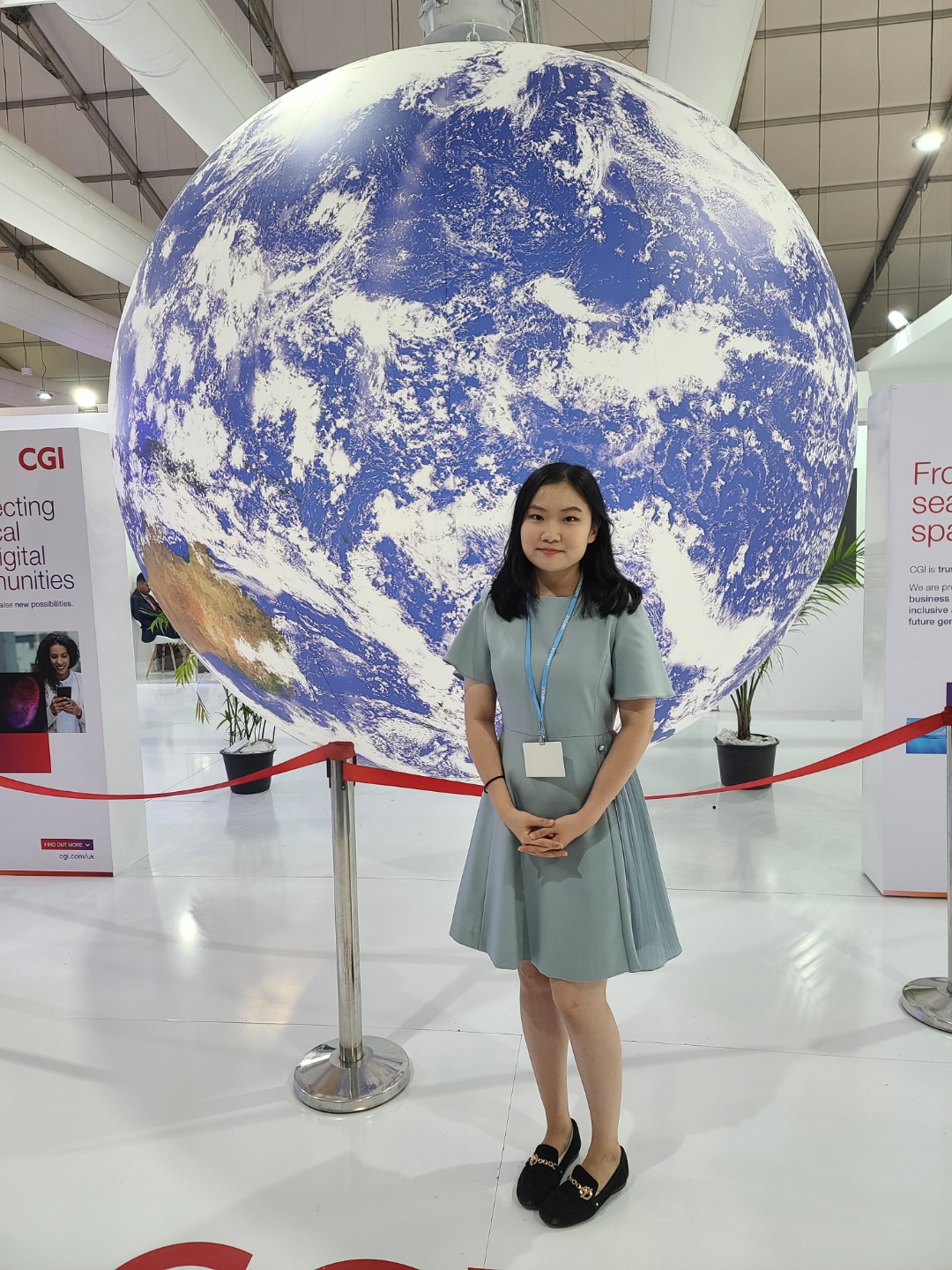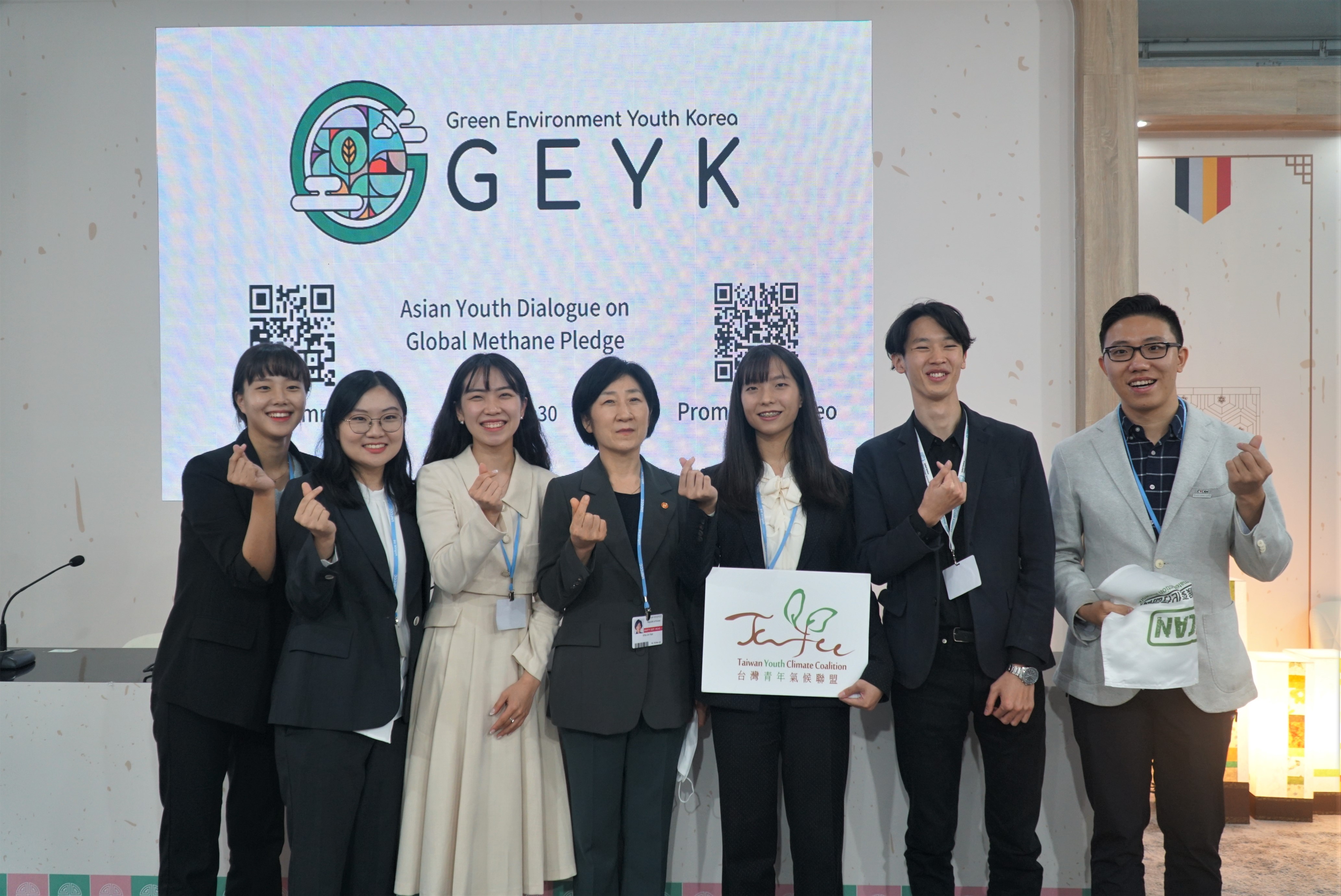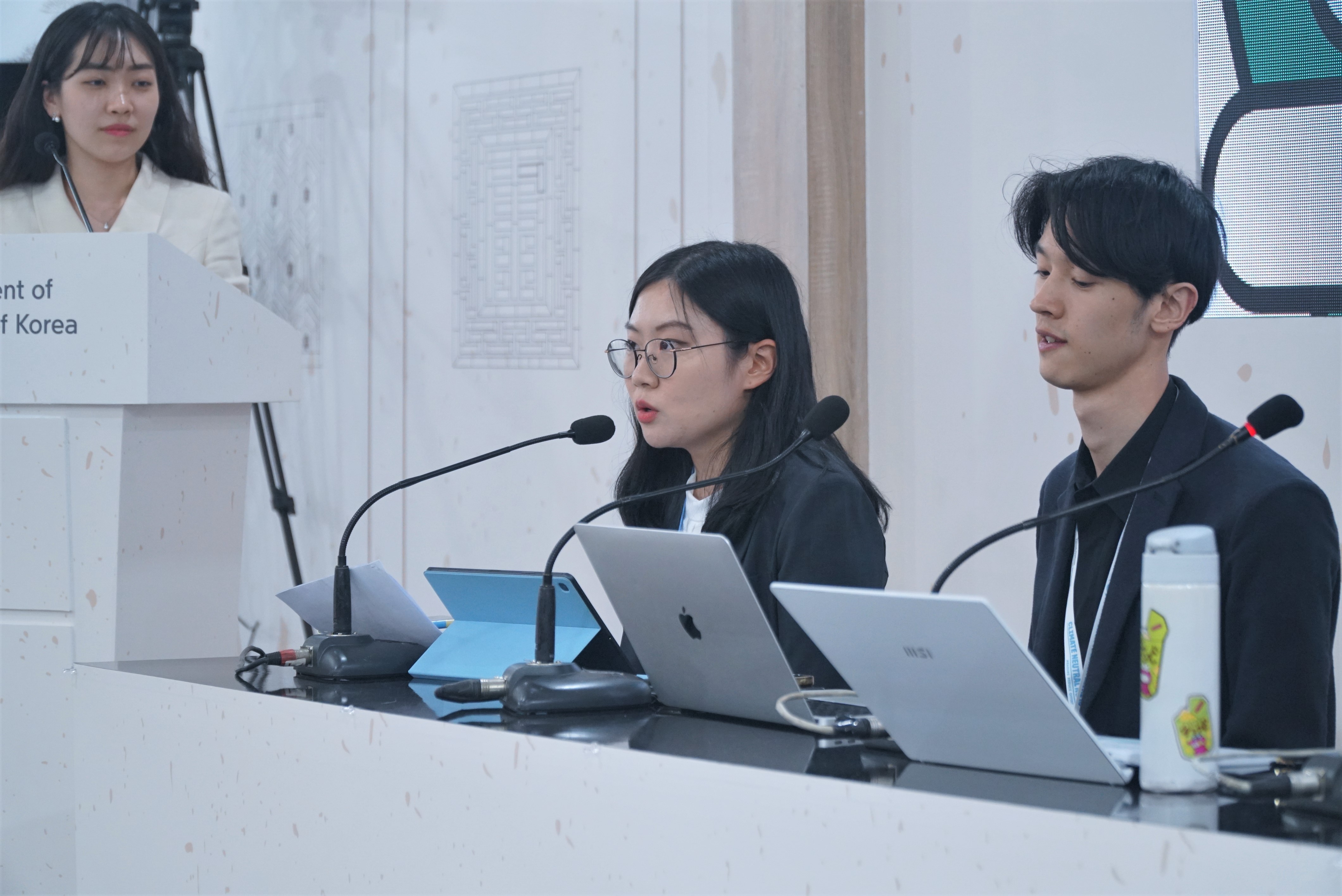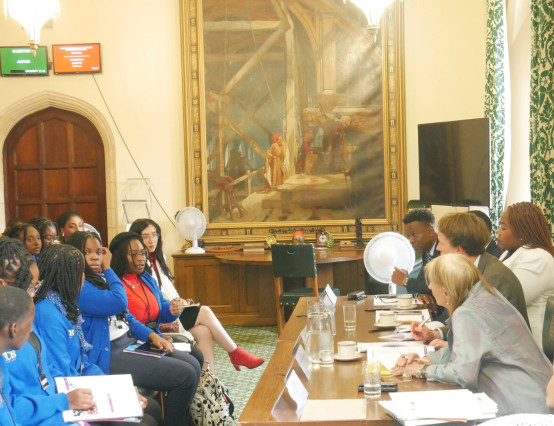Could you please introduce yourself to the reader and the country you represented?
Greetings! My name is Yunjoo Cho from South Korea. I attended COP27 in Sharm El-Sheikh as one of the Korean youth delegates. I am currently an undergraduate student studying Environmental Health Science and Geography at Konkuk University who has a background in the biodiversity & ecosystem management field.
What was your interest in COP27 before attending?
I attended COP27 to hold a side event about the Global Methane Pledge and Asian youth dialogue at Korean Pavilion. We invited youth panels from Climate Youth Japan, Taiwan Youth for Climate Coalition, and China Youth Climate Action Network, and each panel introduced ongoing methane-related policies and efforts being made by private sectors/civil societies. I was on a Korean youth panel and dealt with Korea’s cases in methane reduction efforts.
Do you have any other policymaking experience?
Before attending COP27, I was interested as to whether the Loss & Damage Fund would be established and also some discussions being made about nature-based solutions. Those two were the key agendas I was following up on before going to Egypt.
I have experience in making policy proposals as a member of the OECD Youthwise. OECD selected 24 youths across the globe who possess a nationality in OECD nations since 2021. I am a member of the 2022 cohort. Youthwise supported the 2022 Ministerial Council Meeting, under the topic of: 'The future we want: Better Policies for the Next Generation and a Sustainable Transition'. We worked on our Youth manifesto calling for these three main points: Intergenerational power-sharing, Future proof tests on new policies, and Fair wages for internships.
What did you aim to bring to the conference?
Based on my working experience in the biodiversity field, my main interests in COP27 were Nature-based Solutions and Blue Carbon. As the biodiversity-related agenda in the Climate Change Conference is becoming one of the key topics in COP, I wished to follow up on the flow of those issues.
I also wanted to talk to many stakeholders and other activists to share thoughts about ongoing climate issues, and broaden my perspective on how I define the world.
Could you tell us more about the organisation that you went with?
GEYK is a youth platform in South Korea founded in 2014, to share knowledge and experiences, take action locally and internationally, run projects, and inspire people to care about climate change. We aim to have a role in decision-making on climate change policies to make the world sustainable, just, and fair. It is run by highly motivated youths committed to climate change issues. We believe that an inspiring vision and cross-generational cooperation are needed to solve the climate change crisis and create a sustainable future.
I joined Green Environment Youth Korea(GEYK) in 2020, and I am both a founder and Project Manager of the Biodiversity Team. I managed various biodiversity-related youth activities, such as coordinating birdwatching in a wetland, planning a field trip to the place where a wildfire was devastating, and more. I am now planning a Youth Biodiversity Forum in Seoul, Korea.
Did any speakers/policies stand out to you?
I met Ms.Wanjira Mathai from World Resources Institute, an expert of the forestry of Africa - who is also a daughter of a renowned environmental figure of Kenya, Ms.Wangari Mathai. Ms.Wanjira Mathai highlighted the importance of Nature-based Solutions and added that forestry restoration with powerful partnerships among stakeholders is a key method. She also stated, "Forestry is a source of everything good." which is a quote from Ms.Wangari Mathai, who gave a huge inspiration for a nature-loving mindset to her. While listening to her speech, I agreed that forestry restoration is one of the crucial solutions to combat climate change.
Forestry is a source of everything good
However, at the same time, I could not help but consider the situation in my home country, Korea. There are very few spaces left in Korea to plant trees now. But the speech given by Dr. Soo Jeong Myeong from Korea Environment Institute refreshed my mind.
She stated that since there is a high capability of Korea’s wetlands to store carbon, the Korean government decided to create salt marshes in the coastal areas of Korea until 2050. It gave me a huge inspiration to dive into the field of wetland ecosystems.
What do you think went well?
Obviously, the biggest achievement in COP27 was the decision to develop the Loss & Damage Fund. It was one of the key topics that was going to be dealt with at COP27, and I did not expect this to be achieved. But when I realized that the fund would be initiated, it made me think that ‘Justice is alive'. It was a huge success attained by stakeholders from developing countries and climate activists who shouted for a just transition.
I also feel that the dialogue of the biodiversity agenda has become more active than in the past. I attended some sessions regarding biodiversity and nature-based solutions, and what I was impressed with was that a lot of experts from the related fields support the idea that the biodiversity agenda should be jointly dealt with the climate change agenda. In my personal opinion, it is very crucial to deal with those two issues together in one seat, as they are having tremendous impacts on each other.
What do you think didn’t go well?
Every time I attend huge conferences or forums, I always feel down by the fact that only people or stakeholders who are interested in climate issues are the main attendees. Yet the capacity building through such huge events like COP27 is highly invaluable for them for sure. However, there are numerous other people who are not interested in or not believing in climate change issues that society needs to convince–but they are not given any opportunities to join the active sessions happening at COP.
Awareness raising is one of the significant factors in dealing with this ongoing crisis, but the COP itself is closing doors to external people. It is a bit contradictory.
How could world leaders, countries and states do better?
The decision-makers should put themselves into other people’s shoes. They should listen to people who are living under the ongoing crisis and include indigenous and local people’s voices in the decision-making process as they are very vulnerable to the crisis.
For example, there was a devastating flood in Pakistan this summer, it made 8 million people lose their homes, and at least 1,700 people lost their lives. They are also suffering from waterborne diseases caused by floods – such as cholera and diarrhoea.
So the world leaders who have power should accept these issues highly critically and reflect those into the negotiation and the policy.
What are your hopes for next year at COP28?
There are two things I hope for the COP happening in Dubai. The first thing is about the Loss & Damage Fund. Although the fund was decided to be created this year, the specific details of the process such as who will raise funds, how the fund will be organized, when the fund will be initiated, and more, were not decided. More specific details should be arranged in the next COP.
Second, some decisions should be made in biodiversity and nature-based solutions (NbS) related topics. There were some discussions dealing with nature-based solutions in Glasgow, but they did not go well.
Many parties agreed that the term was too ambiguous. And hopefully, there were actually quite a lot of active sessions about biodiversity and NbS in Sharm El-Sheikh, and many experts were positive about the outlook of NbS. That is why I am expecting further achievements on these topics at the next COP.
If you could send a message to COP37, what would you say?
Let’s recall COP17, which was held in 2011. The Green Climate Fund to support developing countries to adapt to climate change was discussed, and negotiators agreed to be part of a legally binding treaty to address global warming. Also, the president of the conference, Maite Nkoana-Mashabane, declared COP17 was a success.
However, looking at the world where the climate crisis is getting worse right now, it is quite difficult for me to say that the COP held 10 years ago was a success – despite its achievements. And I do not want to repeat what I have just said after ten years.
I wish there were more just and fair policies for everyone 10 years later, and not repeating the similar repertoires happening now. There should be many more positive developments and changes made than now.
Any further comments?
My ultimate goal is to terminate the discussion of climate change within 20 years. I do not want a future where COP50 or COP80 exists. Solutions should be carried out as quickly as possible, and to make this happen, negotiators should have an altruistic mindset. It's a man-made problem, so humans have the key to solving it. We should believe in ourselves and never give up protecting our only planet.








0 Comments